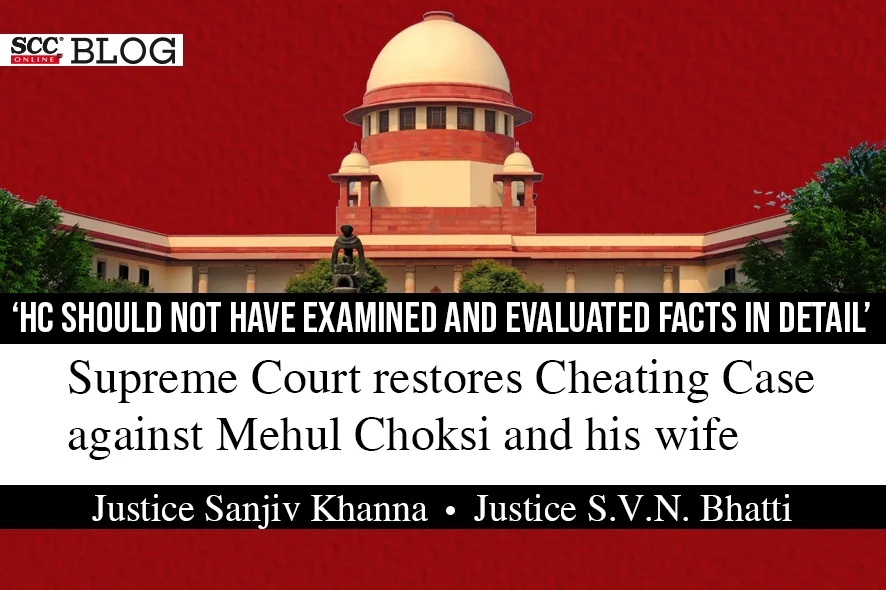Supreme Court: In an appeal against Gujarat High Court quashing the First Information Report (‘FIR’) in Cheating case against Mehul Choksi, his wife, the Division Bench of Sanjiv Khanna and S.V.N. Bhatti, JJ. restored the said case while reprimanding the High Court for its detailed factual examination and evaluation.
After examining the impugned judgment passed by the Gujarat High Court on 5-05-2017 allowing to quash the FIR, the Court indicated that a detailed factual examination and evaluation had been undertaken, which should not have been done by the High Court in the Court’s opinion.
The Court commented that there were disputed questions of fact since the respondents claimed that the two agreements dated 25-07-2013 and 13-08-2013 were not binding on the company Geetanjali Jewellery Retail Limited (‘GJRL’), a subsidiary of Gitanjali Gems Limited.
Contentions Pointed by Court
The Counsel for appellant claimed the agreements to be valid and binding, and that in terms of the agreement dated 13-08-2013, the respondents had agreed to return 24 karat pure gold bars for which consideration was already paid but remained in deposit with GJRL in fiduciary capacity. Documents in the form of confirmation letters and statements of accounts signed by the Associate Vice-President (Finance) on behalf of GJRL were also noted to confirm the fiduciary nature of the deposit. It was contended by the respondents that one of the persons concerned had resigned on 9-12-2013 and that the agreements executed by him lacked authority. Contradictions emerging in the appellant’s stand were also claimed by the respondents regarding notice dated 15-07-2014 referring to breach of contract.
The Court regarded the assertions to be disputed factual questions since the signatures of the persons concerned or their designations were not disputed by the respondents. It further explained that the impugned judgment referred to the requirements of Sections 406 and 420 of the Penal Code, 1860 (‘IPC’), but refused to examine the same in detail since the facts had to be ascertained including the nature and character of the deposit.
The Court pointed towards the respondents’ contentions that the appellant had not accounted and paid for the sale proceeds in terms of agreement dated 13-08-2013 which was described as ‘Operational and Commercial Agreement’, as acknowledged by the Court, and pointed towards the exception taken by the appellant arguing that the reasoning did not account for specific clause in the agreement dated 25-07-2013 but did not override the fiduciary relationship with respect to the gold bars, and set off was not available.
Court’s Observations
The Court expressed that the High Court should not have examined and recorded the conclusion on the disputed fact to quash the FIR. The order dated 14-09-2016 passed by the High Court stated that 17 persons had been examined by the investigating officer, statements were recorded under Sections 161 and 164 of the Criminal Procedure Code, 1973 (‘CrPC’), which were not considered. Pointing towards High Court’s observations with specific reference to Priti Mehul Choksi, the Court expressed that “We believe that these observations are general observations to the effect that a wife/spouse could not be said to be involved vicariously” and refrained from commenting anything leaving it over to investigating authorities if a specific role attributable to Priti Mehul Choksi could be ascertained.
The Court refused to go into factual aspects since it was a matter to be considered and examined in the investigation. It explained that “A wrong may be civil wrong, or in a given case be a civil wrong and equally constitute a criminal offence. The ingredients of a criminal offence should be satisfied.” Thus, the Court refrained from making detailed observations in this regard.
Therefore, the Court set aside the impugned judgment passed by the High Court and allowed the instant appeal. The Court clarified that the comments/observations in the instant order were not to be read as merits and that investigation would continue, and also directed the investigating officers to keep in mind the Supreme Court and High Court rulings interpreting Sections 406, 420, 464 and 465 etc. of IPC.
[Digvijaysinh Himmatsinh Jadeja v. State Of Gujarat, 2023 SCC OnLine SC 1610, Order dated 29-11-2023]
Advocates who appeared in this case :
For Appellants: Advocate on Record Shubhranshu Padhi, Advocate Niroop Sukrithy, Advocate Jay Nirupam, Advocate D. Girish Kumar
For Respondents: Advocate Archana Pathak Dave, Advocate on Record Swati Ghildiyal, Advocate Devyani Bhatt, Advocate Vijay Aggarwal, Advocate Yugant Sharma, Advocate on Record Akbar Siddique, Advocate Mukul Malik, Advocate Parwez Akhtar, Advocate Malik Javed Ansari, Advocate Harsh Kumar Singh, Advocate Animesh Mishra, Advocate Parv K. Garg








